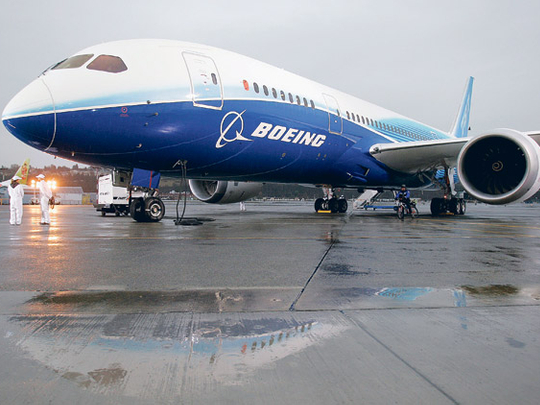
Seattle: The World Trade Organisation found Boeing got illegal aid from the US, European government officials said as they stepped up calls for a negotiated settlement to a trans-Atlantic fight over aircraft subsidies.
The confidential panel ruling "condemns the massive subsidies received by Boeing which violate WTO rules," French Transport Minister Dominique Bussereau said in a statement. The European Commission, the 27-nation EU's trade authority in Brussels, called the verdict a "very good result".
The report follows a WTO decision in June that Airbus got billions of euros in low-interest government loans to develop planes including the A380 superjumbo. With both sides faulted for breaking the rules amid a dispute that has dragged out for six years, the verdict increases the likelihood of a negotiated settlement over aid to planemakers in the $70 billion (Dh257 billion) civil aviation industry.
"This sort of squabbling will come to an end at some point," said British Airways Chief Executive Officer Willie Walsh, whose airline flies both Boeing and Airbus aircraft. "I don't see that anybody really benefits from it. I am open to it being settled in any way."
Federal research
The ruling found the US provided subsidies to Boeing through federal research grants and state support, giving it unfair advantages over Airbus in selling airplanes including the 787 Dreamliner in global markets, according to a person familiar with the case, who declined to be named because the document remains confidential until next year.
The judgment addressed EU claims that Boeing benefited from more than $10 billion in unfair assistance from both Nasa and the US Defence Department. The EU also claimed illegal aid to Boeing by states including Washington, Kansas and Illinois.
Boeing, which hadn't yet seen the confidential ruling, said reports on the contents from those who had access to it indicate a "massive rejection" of the EU case.
"The WTO findings against the US are likely to require few changes in US policies and practices," Chicago-based Boeing said in a statement.
The US and the EU filed counter-cases at the WTO after the administration of President George W. Bush unilaterally walked out of a 1992 aircraft-aid accord with the EU. The dispute is the largest ever before the WTO, which has the power to authorise retaliatory sanctions against countries that fail to comply with its rulings.
The dual cases have become more important as rivals from China, Canada and Brazil emerge. The rulings may set industry- defining guidelines for government support in civil aviation.
"Hopefully these rulings will lead to the two parties entering into talks to create a new framework for R&D funding going forward," said Robert Stallard, an aerospace analyst with RBC Capital Markets in New York. "Ideally, this should take in other nations."
In their June 30 public decision backing the US, WTO judges found that Toulouse, France-based Airbus benefited from the support of European governments, with subsidies for the A380 topping the list of violations. Airbus, which overtook Boeing in the market for commercial aircraft in 2003, is a unit of European Aeronautic, Defense & Space Co.
The EU appealed the ruling in July, and the US said last month it was challenging two parts of the WTO decision on which the panel "made mistakes". Boeing wants Airbus to pay back the illegal portion of launch aid until repayments reach what they would have been had the loans been made at market rates.
Nefeterius McPherson, a spokeswoman for the US Trade Representative's office in Washington, declined to comcment on the details of the ruling, citing the WTO's confidentiality requirements.
The commission said it would study the ruling "very carefully to assess the next steps," renewed a call for talks with the US and said "only negotiations at the highest political level can lead to a real solution".
"I believe even more strongly than before that the question of subsidies to aircraft manufacturers can be settled only by way of negotiations," EU Trade Commissioner Karel De Gucht said in a statement.












